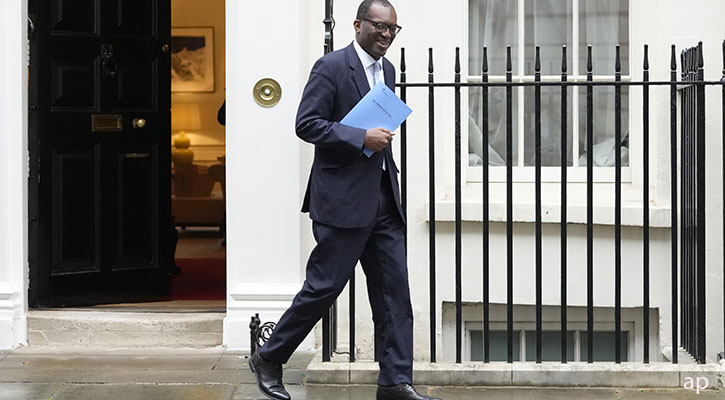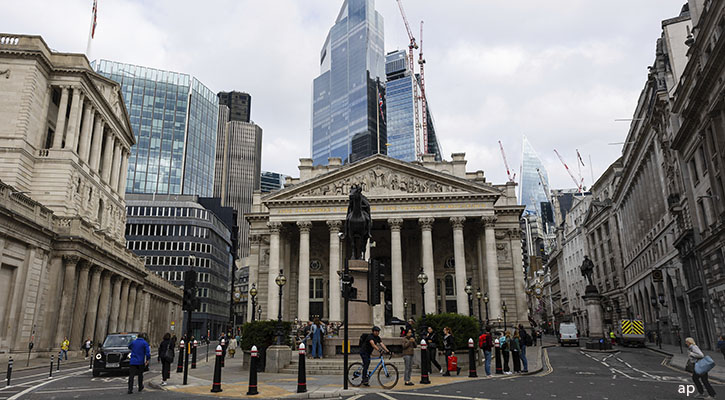
It’s been two weeks since the UK government’s September 23 mini-Budget, which whipsawed UK markets across equities, bonds, and sterling during the subsequent days.
It could be natural for people to panic during market turbulence and worry about the negatives in front of you. But investors need to take a long-term mindset, and reacting to the immediacy of macroeconomic news can more harm than good.
If we look back to the day before the mini-Budget, the Bank of England announced a 50-basis-point interest hike and stated the UK was in recession. UK bond yields rose, and a spike in the US bond market took place that same day. Despite the outlook, the Bank of England failed to keep up with the Fed’s trajectory of a 75-basis-point rate hike in September. We even saw one Monetary Policy Committee member vote for a mere 25-basis-point rise. This affected sterling, and there was a continued global rush to the US dollar.
Come mini-Budget day, a lot of the new details took market participants by surprise. To launch a Growth Programme with increased government spending in the midst of an inflationary environment and a need to hike interest rates amid stagflation was bold, to say the least. Many see it as reckless. But looking at the details, 90% of the spending in terms of the volume of money being put into the budget was already announced a few weeks prior. This includes the large-scale energy rescue package.
What is likely to have exacerbated the selloff in UK gilts is linked to the pension market. A number of defined-benefit pension funds make use of liability-driven investments (LDI). These schemes help the pension fund’s liability mismatch, using derivatives to better match their assets with long-term liabilities. The collateral posted to the counterparty behind the derivatives will come in the form of high-quality liquid assets such as government bonds.
Margin Calls
Having to meet margin calls likely added fuel to the fire, with bonds being sold and their yields spiking further from the day before. This resulted in the Bank of England intervening in the gilt market. It is clear that volatility has been extremely high, as exemplified by daily returns last week of the Inflation-Linked UK Government Bond 2073: -27%, -24%, -20%, followed by 115%, 16%, and 33%.
In the year to date to September 30, global bonds are down 20% in US dollar terms, although when hedged to sterling, the Bloomberg Global Aggregate Index is down 12.8% in sterling over that period. UK gilts have felt the brunt of it, sinking 25.1%.
Sterling also sold off heavily amid the furore, but a week later, on Friday September 30, it was back to where it had been the day before the minibudget. In currency markets, the main story this year is dollar strength against the vast majority of currencies, including the pound.
Investors often look for a hook to frame a large bounce or dip around a particular event; in this case, announcements on mini-Budget day. But a lot was already happening just before this. Some commentators are anxious about a potential liquidity-driven event, but in the context of global issues, the UK isn’t an island. We have seen double-digit inflation set in across Europe, energy bills soaring (the UK’s commitment for its population to counter this is the highest of any European country, although taxpayers will bear most of the cost in the long run), and consumers everywhere really feeling the squeeze.
Furthermore, Apple announced weakening demand for its new iPhone, leading to tech stock selling pressure; China’s growth is rapidly stalling; and US equities hit a two-year low. In fact, during September and in the year to date, the FTSE All Share Stock Index fell less than global equities and outperformed Nasdaq by a large margin.
What Are Fund Managers Doing?
There may be more pain to come, with the possibility of another leg of market falls.
Ruffer, whose strategy has a Morningstar Analyst Rating of Bronze and a focus on capital preservation, has completely battened down the hatches. Team head Henry Maxey thinks there is growing pressure in markets, linked to a combination of interest-rate increases and central banks now on a path of quantitative tightening, and that we will see further rolling liquidity crises as financial conditions continue to tighten. As a result he is “extremely cautious”, and the strategy has its lowest-ever equity exposure. He believes that cash provides optionality to trade in distressed assets but isn't yet ready to put the dry powder to work. Away from the capital preservation side, fund managers we have been speaking to in recent weeks are admitting that, while things could get worse, they see fairly attractive valuations in parts of equities and fixed income. This margin of safety is opening up long-term opportunities.
Alex Savvides, manager of the Silver-rated JOHCM UK Dynamic fund, appreciates that there is large earnings uncertainty but points to having never seen single-digit P/E like we have today. He is therefore cautiously optimistic about the market and sees UK valuations as cheap on an international basis. The investment process here is based around identifying companies undergoing change not yet fully recognised by the market and looks to find management teams willing to make changes that will improve returns on capital and cash flows. For now, the team is finding ideas in undervalued growth and restructuring prospects, rather than pure recovery plays. One contrarian area it has been adding to in the last 12 months is real estate. The impact of downward revisions has been felt, but with Land Securities, for example, Savvides is buoyed by better capital-allocation decisions taking place.
On the global equities side, James Thomson, manager of the Bronze-rated Rathbone Global Opportunities fund, has a growth bias, which has hampered performance so far this year. Amid the worst market sentiment Thomson has seen since 2008, he has used the pullback to buy into what he sees as quality growth firms, while avoiding some of the high-growth darlings of recent years, such as Shopify, which was sold in the first quarter. He has a defensive part of the portfolio through companies such as Costco and McDonald's; this stands at 20% of assets. But on a five-year view, he doesn't expect those types of firms to drive performance. When looking for a more pronounced growth trajectory, and with quality in mind, his recent additions include Equifax, Boston Scientific, and Remy Cointreau.
In the multi-asset space, Jacob de Tusch-Lec, manager of Bronze-rated Artemis Monthly Distribution, looks for stocks capable of contributing to the fund’s monthly income objective. Along with a value bent, this leads to an underweight to lower-yielding areas like the US and technology, but de Tusch-Lec currently finds opportunities in areas like Europe and Japan where divided yields offer an attractive spread over the local risk-free rate, in local currency terms. Meanwhile, his comanagers responsible for the fund’s fixed-income sleeve, David Ennett and Jack Holmes, see compelling risk/reward on offer in the US high-yield sector. The team tends to avoid large swings in its equity and bond allocation but, with current yields on offer, is leaning to selective new high-yield ideas. What the team sees as world-class companies are now on yields of 7-8% following the moves seen in rates and spreads for the year to date.
When it comes to fixed income, within the Global Flexible Bond cohort, Silver-rated M&G Global Macro Bond entered the period of market turmoil with low exposure to UK assets. Manager Jim Leaviss took advantage of the selloff and added around 0.5 years of duration by buying gilts. One example were gilts maturing in 2051 at a yield of 5.5%.
Ariel Bezalel, manager of the Jupiter Strategic Bond fund, worries about the pace of interest-rate hikes taking place amid a gloomy economic backdrop. He thinks that tightening policy further from here through rate hikes and tapering will cause an unnecessarily deep and painful global recession. Bezalel sees inflation easing and, with a recession, slowing even more rapidly. Coupled with China weakening, he believes there will be a pivot from beating inflation to avoiding economic depression. This makes him extremely positive on high-quality medium- and long-dated government bonds in the US and Australia.



























